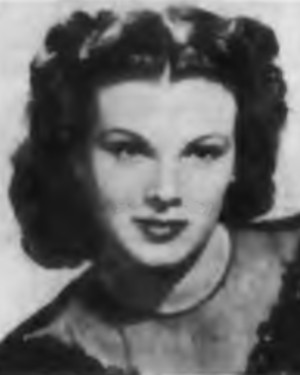Dell Parker
Showgirl and singer Dell Parker flitted back and forth between bands and Broadway but never managed a major break. Parker made her first big splash in October 1941 as part of the Ed Wynn revue Boys and Girls Together, in which she played the roles of Miss Persian Room and the Cactus Flower Girl. A pretty redhead, she quickly attracted the attention of the gossip columns and a number of male admirers.
When Boys and Girls Together ended its Broadway run in March 1942, Parker turned her newfound recognition into a short career as a band vocalist, joining Harry James in June of that year but staying only a month before becoming part of Bob Astor’s swing orchestra. She left Astor in August 1942, remaining in New York when the band went west that month. In September, she very briefly joined Charlie Barnet. Barnet had just lost singer Frances Wayne and was using Nita Bradley as a temporary replacement while he searched for a permanent girl. Parker was initially chosen as Wayne’s successor but was gone in less than two weeks, with Perry Russell briefly taking her place before Bradley returned.
In March 1943, Parker formed her own small combo, a three-piece backing unit consisting of clarinet, piano, and guitar. Billed as Three Shirts and a Skirt, the act lasted less than two weeks before the draft claimed the Shirts, and Parker once again joined Barnet, and again she stayed less than two weeks. She signed with Gray Gordon’s band in April and embarked with them on a USO camp tour which lasted through at least May.
Parker returned to Broadway in April 1944 as a showgirl in the musical Follow the Girls. Though she was back on stage, she planned to continue her singing career. That summer, she threatened to sue another band vocalist using the same name, forcing the other Dell Parker to become Dee.[1] In October 1944, while working in Follow the Girls, Parker sang at a Broadway night club after each show’s evening performance. In December, one of the show’s dancers, Valia Valentinoff, threatened to take a dispute with Parker to Actor’s Equity, the union representing theater performers, claiming that each night Parker yelled insults at him from offstage during his specialty number. The two had been romantically linked.
Parker left Follow the Girls in March or April 1945.[2] In May, she sang with Jean Goldkette’s orchestra on radio, and in September 1946 she was back with Astor. In 1949, Parker could be found working as a single in New York clubs. She appeared as a showgirl in two more Broadway productions, Bless You All, which ran from December 1950 to February 1951, and Two on the Aisle, which ran from June 1951 to March 1952. In June 1952, in between show business jobs, Parker worked as a used car salesperson in the Bronx, earning $200 a week. “The money is great, but oh those wolves!” she told columnist Mel Heimer.
Parker continued to sing through at least August 1953, when she was also described as a comedienne by Dorothy Kilgallen. Parker was often in the gossip columns during her career, being romantically linked to a variety of men, including tennis stars, basketball players, singer Jack Leonard, and bandleader Dick Stabile. Beyond 1953, Parker disappears into the mists of history.
Notes
Dee Parker had been using the name Dell Parker for at least the past year but had only recently come into the spotlight with Vaughn Monroe’s band in April 1944. ↩︎
Follow the Girls ran through May 1946. ↩︎
Sources
- “Dell Parker.” Internet Broadway Database. Accessed 2 Sep. 2023.
- Burr, Eugene. “New Plays on Broadway.” Billboard 12 Oct. 1940: 17.
- Kilgallen, Dorothy. “Tales from Times Square.” Lowell Sun and Citizen-Leader [Lowell, Massachusetts] 7 Jul. 1941: 2.
- “Bob Astor Ork In Shakeup.” Down Beat 1 Oct. 1941: 7.
- “Orchestra Notes.” Billboard 11 Oct. 1941: 11.
- “Dottie Joins Astor.” Down Beat 1 Sep. 1942: 3.
- “Changes in Personnel of Bands.” Down Beat 1 Sep. 1942: 14.
- “Orchestra Notes.” Billboard 26 Sep. 1942: 21.
- “Orchestra Notes.” Billboard 3 Oct. 1942: 23.
- “Dell Has Unit.” Down Beat 15 Mar. 1943: 14.
- “Barnet Using Two Canaries.” Down Beat 1 Apr. 1943: 2.
- “Gordon Gets Dell.” Down Beat 15 Apr. 1943: 3.
- “Trummie Young In Barnet Band.” Down Beat 15 Apr. 1943: 5.
- “Remember Youngstown, Will?” Down Beat 1 Jun. 1943: 15.
- Kilgallen, Dorothy. “Dorothy Kilgallen.” Lowell Sun and Citizen-Leader [Lowell, Massachusetts] 3 Apr. 1944: 13.
- “Broadway Openings: Follow the Girls.” Billboard 15 Apr. 1944: 29.
- Kilgallen, Dorothy. “Dorothy Kilgallen.” Lowell Sun and Citizen-Leader [Lowell, Massachusetts] 19 Aug. 1944: 11.
- “Strictly Ad Lib.” Down Beat 1 Oct. 1944: 5.
- “Broadway Showlog.” Billboard 2 Dec. 1944: 30.
- Kilgallen, Dorothy. “Voice of Broadway.” Pottstown Mercury [Pottstown, Pennsylvania] 11 Dec. 1944: 4.
- “Broadway Showlog.” Billboard 17 Mar. 1945: 31.
- “This Is WIBU.” Waunakee Tribune [Waunakee, Wisconsin] 24 May 1945: 5.
- Sullivan, Ed. “Little Old New York.” The Oil City Derrick [Oil City, Pennsylvania] 14 Jan. 1946: 6.
- Kilgallen, Dorothy. “New York Notes.” Mansfield News-Journal [Mansfield, Ohio] 10 Aug. 1946: 3.
- Winchell, Walter. “Walter Winchell.” Naugatuck Daily News [Naugatuck, Connecticut] 19 Aug. 1946: 4.
- “Astor Band to Feature.” The Oil City Derrick [Oil City, Pennsylvania] 4 Sep. 1946: 5.
- “Strictly Ad Lib.” Down Beat 20 May 1949: 5.
- “The Nightcap, New York.” Billboard 17 Dec. 1949: 43.
- Wilson, Earl. “It Happened Last Night.” The Uniontown Morning Herald [Uniontown, Pennsylvania] 5 Mar. 1953: 4.
- Heimer, Mel. “My New York.” The Winona Republican-Herald [Winona, Minnesota] 16 Jun. 1952: 5.
- Wilson, Earl. “It Happened Last Night.” The Winona Republican-Herald [Winona, Minnesota] 5 Aug. 1953: 4.
- Kilgallen, Dorothy. “Dorothy Kilgallen.” Lowell Sun and Citizen-Leader [Lowell, Massachusetts] 15 Oct. 1953: 7.
